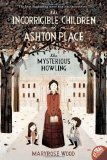
 The Incorrigible Children of Ashton Place, Book One
The Incorrigible Children of Ashton Place, Book OneThe Mysterious Howling
Review posted December 16, 2012.
Balzer + Bray (HarperCollins), 2010. 267 pages.
Starred Review
2012 Sonderbooks Stand-out: #1 Children's Fiction: Fantasy and Science Fiction
I'm so glad I finally read this book! In a way, it's nice that I took so long, because the final three words are those dreaded ones, "To Be Continued . . ." I can go straight to rushing to read the next two volumes.
I found The Mysterious Howling completely delightful. The story is of Penelope Lumley, a Poor but Deserving young fifteen-year-old girl, penniless and sent away from her boarding school to try her luck at a grand house, Ashton Place, to be the governess.
Her interview with Lady Constance is unusual. Even Penelope, with no experience in such things, finds it surprising how quickly Lady Constance offers her the job and that she won't speak of the children. She closes the interview like this:
And with that, they both affixed their signatures to the bottom of the letter of terms that Lord Ashton had prepared. Penelope hardly thought this necessary, but Lady Constance assured her that signed, binding contracts were the custom in these parts, a charming formality which she would not dream of omitting.
When Penelope does meet the children, she learns that they were, in fact, raised by wolves, and discovered by the mysterious Lord Ashton in Ashton Forest on one of his hunting parties. Penelope must revise her hopes and dreams of what she can teach the children, but her compassion, and her binding contract, compel her to stay.
The rest of the book concerns itself with Penelope teaching the children, trying to get them not to chase squirrels and teach them enough words to speak politely to people. In fact, when Lady Constance plans a big party on Christmas Day, Lord Ashton particularly wants the children to be there, so Penelope is under deep pressure to teach them proper things to say to the guests, and drill them on how to behave. It's not her fault if things don't go as she plans....
Meanwhile, there's a mystery at Ashton Place. In a tribute to Jane Eyre, besides the mysterious howling from the children before Penelope met them, there's a sound coming from a room in the attic.
I'm not sure who exactly the audience for this book is, except that I am firmly in it. Definitely those who have read and loved Jane Eyre will find themselves laughing over Penelope Lumley's expectations of being a governess and the rich contrast with the children she actually teaches. There are obvious sections inserted to delight the adult reader, such as this one:
"My heavens!" Mrs. Clarke exclaimed. "I am sure I have never seen three such extraordinarily handsome and well-turned out children!"
As you may know complimentary remarks of this type are all too often made by well-meaning adults to children who are, to be frank, perfectly ordinary-looking. This practice of overstating the case is called hyperbole. Hyperbole is usually harmless, but in some cases it has been known to precipitate unneccessary wars as well as a painful gaseous condition called stock market bubbles. For safety's sake, then, hyperbole should be used with restraint and only by those with the proper literary training.
However, the book is written at a child's reading level, and I do think children will enjoy the story. There is silliness with the children learning how to speak and how to behave, despite a tendency toward howling, and a thread of a mysterious something bigger throughout the story.
Here's a section shortly after Penelope has learned the nature of her charges. She goes, naturally enough, to the library:
It was chilly and dark, even on a sunny afternoon, with many more books than even the library at Swanburne had contained. The section on animal behavior was exceptionally well stocked. In short, Penelope was in library heaven, and she prepared to start taking notes. She quickly found a book on wolves, which provided many thought-provoking tidbits of information and even shed light on some of the children's more intriguing habits -- the way Alexander, for instance, would occasionally discipline his siblings by knocking them to the ground and rolling them onto their backs. Or the way Beowulf would rise from his bed during the night and gaze out the nursery window, mournfully ahwooing for hours on end. Or Cassiopeia's tendency to scamper closely after Penelope and sit at her feet the instant she stopped moving.
Of course, I can't help but think the most ideal audience would be a family read-aloud, or perhaps a classroom read-aloud. I am planning to listen to the second book on CD, so it will be fun to see if that reader does the story justice.
